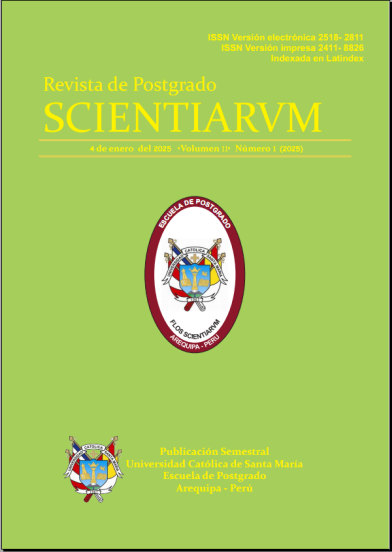LOS CAMBIOS EN LA CAPACIDAD CIVIL Y SU LÓGICA RESPECTO DE LA CONVENCIÓN SOBRE LOS DERECHOS DE LAS PERSONAS CON DISCAPACIDAD: LA CAPACIDAD EN TELA DE JUICIO
CHANGES IN CIVILI CAPACITY AND THERI RATIONALE WITH RESPECT TO THE CONVENTION ON THE RIGHTS OF PERSONS WITH DISABILITIES: CAPACITY UNDER CHALLENGE
Alejandro Patricio Flores Valdivia1, Helena Andrea Iquira Torres Fernández1,
Gelber Ramirez Cueva1
- Universidad Católica de Santa María, Arequipa - Perú
RESUMEN: La persona con discapacidad es aquella con deficiencias físicas o mentales permanentes que encuentra barreras al ejercicio de sus derechos; pero una persona con discapacidad no necesariamente es una persona con incapacidad civil porque este tipo de persona tiene una limitación expresa y legal al ejercicio de sus derechos; tampoco una persona con discapacidad será necesariamente una con capacidad restringida, ya que, estas tienen libertad en el ejercicio de algunos de sus derechos; pero están obligadas a acudir representados legalmente para otros actos. No toda persona con discapacidad o capacidad restringida es una persona sin discernimiento ya que para serlo no se debe encontrar en la aptitud de distinguir el bien del mal. Es necesario un análisis explicativo sobre como la modificación de la capacidad civil a partir del Decreto legislativo N°1384 ha sido un intento de hacer bien las cosas; pero ha tenido desaciertos al derogar los artículos 1974 y 1975 del Código Civil, que establecían supuestos de hecho de protección a las personas sin discernimiento, respetando el principio de igualdad de condiciones reconocido por la Convención sobre las personas con discapacidad, y brindando claridad a los operadores del derecho sobre su debido actuar en los supuestos contenidos en las citadas normas indebidamente derogadas.
Palabras Claves: Capacidad civil, incapacidad civil, discapacidad, discernimiento.
ABSTRACT: A person with disability is a person with permanent physical or mental deficiencies who encounters barriers to the exercise of his rights; but a person with disability is not necessarily a person with civil incapacity because this type of person has an express and legal limitation to the exercise of his rights; neither a person with disability will necessarily be a person with restricted capacity, since they have freedom in the exercise of some of their rights; but they are obliged to be legally represented for other acts. Not every person with disability or restricted capacity is a person without discernment, since to be so, he/she must not be able to distinguish right from wrong. It is necessary an explanatory analysis on how the modification of the civil capacity from the Legislative Decree N° 1384 has been an attempt to do things right; but it has had mistakes by repealing Articles 1974 and 1975 of the Civil Code, which established factual assumptions of protection to persons without discernment, respecting the principle of equality of conditions recognized by the Convention on persons with disabilities, and providing clarity to the operators of law on their due action in the assumptions contained in those unduly repealed rules.
Key words: Civil capacity, civil incapacity, disability, discernment.
Revista Seleccionada
Julio 2022 Volumen 8 - Número 2 P 15-19
DOI: 10.26696/sci.epg.0154
Enlaces
CIENCIAS SOCIALES Y HUMANIDADES
ANÁLISIS CONCEPTUAL Y COMPARATIVO: PROYECTO, PROYECTO DE INVERSIÓN Y ACTIVIDAD
LA INNOVACIÓN PÚBLICA EN EL PERÚ
LA REVOCATORIA DE AUTORIDADES REGIONALES Y MUNICIPALES, UN DERECHO AMPUTADO
MARKETING DIGITAL COMO OPORTUNIDAD PARA MICROEMPRESAS, AREQUIPA - PERÚ, 2022
TRANSPORTE DE ENERGÍA ELÉCTRICA EN CORRIENTE CONTINUA
VIOLENCIA FAMILIAR Y DEBIDO PROCESO: ANÁLISIS DESDE LA EVOLUCIÓN EN LA LEGISLACIÓN PERUANA


